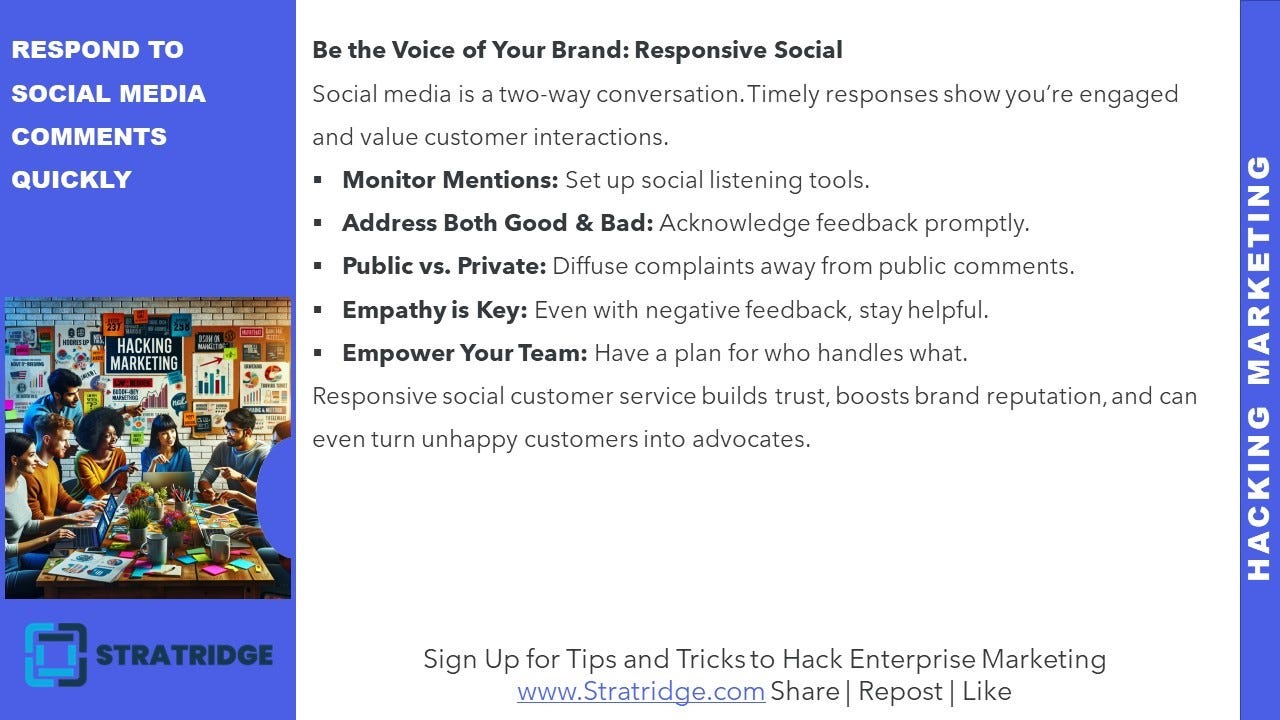In the digital age, social media has transformed from a mere broadcasting platform to a dynamic space for two-way conversations between brands and consumers. Rapid and thoughtful responses on these platforms are crucial, as they reflect a brand's commitment to customer service and engagement.
The Importance of Social Media Responsiveness
Social media's real-time nature has raised consumer expectations for swift interactions. Users often turn to social platforms to seek immediate assistance, share their experiences, or provide feedback about products or services. How a company manages these interactions can significantly impact its public image and customer relations.
Customer Expectations: Today's consumers expect quick responses to their inquiries and complaints. A slow or absent response can lead to frustration and public complaints, potentially harming the brand's reputation.
Brand Reputation and Trust: Consistently quick and empathetic responses can enhance a brand's credibility and trustworthiness among consumers, influencing their purchasing decisions and loyalty.
Opportunity for Advocacy: Effective handling of a complaint or query on social media can transform an unhappy customer into a brand advocate, especially if the resolution exceeds their expectations.
Strategies for Effective Social Media Engagement
Monitor Mentions and Conversations:
Social Listening Tools: Implement tools like Hootsuite, Sprout Social, or Mention to monitor conversations about your brand across various platforms. These tools can alert you to direct mentions and relevant discussions where your brand name is cited.
Real-time Alerts: Set up real-time notifications for mentions, comments, and messages to ensure no customer interactions go unnoticed.
Addressing Both Positive and Negative Feedback:
Acknowledge All Feedback: Respond to both positive and negative comments to show that all customer feedback is valued. Thanking someone for a positive comment can encourage continued engagement, while promptly addressing a complaint can mitigate negative feelings and public perception.
Template Responses: Have templates for common inquiries or complaints, but personalize each response to fit the specific situation. This can save time while still providing a personal touch.
Navigating Public and Private Responses:
Public Responses: Always acknowledge issues publicly first to demonstrate transparency and then offer to resolve complex issues privately through direct messaging or email.
Private Conversations: Handle sensitive issues privately to protect customer privacy and negotiate solutions without the public scrutiny that can escalate situations.
Empathy in Communication:
Understand and Relate: Always convey empathy in your responses, especially when dealing with complaints. Show understanding and a willingness to resolve the issue, which can often diffuse tension and lead to a more productive dialogue.
Training: Regularly train your social media team on the best practices for empathetic communication and ensure they understand the tone and voice that reflect your brand's values.
Empowering Your Social Media Team:
Clear Protocols: Develop clear guidelines and protocols for handling different types of social media interactions. This ensures consistency in your responses and can improve the efficiency of handling inquiries.
Escalation Procedures: Establish a clear escalation path for issues that require attention from higher-level management or other departments.
Enhancing Engagement Through Proactive Interaction
Proactive Posts: Regularly update your social media channels with content that anticipates common customer questions or concerns. This proactive approach can reduce the volume of incoming queries.
Engagement Initiatives: Create interactive posts such as polls, Q&A sessions, and live videos to engage your audience and provide immediate responses in a dynamic environment.
Responding quickly to social media comments is not just about managing a reputation; it's about actively building and enhancing relationships with your customers. By implementing a strategic approach to social media responsiveness, you can demonstrate your brand's commitment to customer service, foster greater consumer loyalty, and potentially convert critics into advocates. As social media continues to evolve as a critical channel for customer service, the brands that excel in this arena will distinguish themselves and gain a competitive edge in the crowded marketplace.
For more marketing tips, tutorials, templates, and tricks, please subscribe to https://www.stratridge.com


